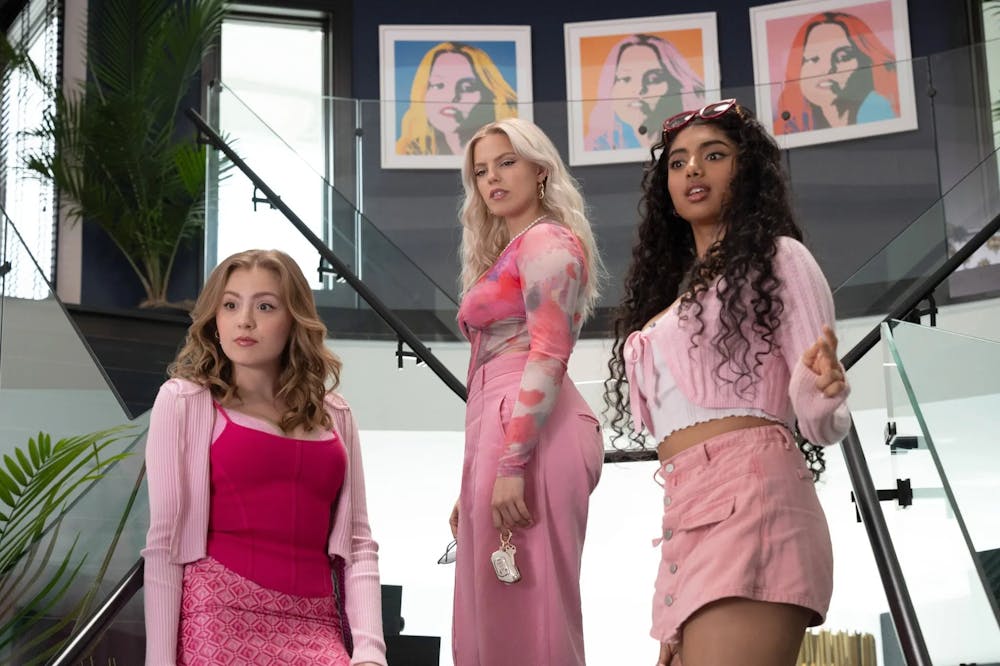The late ’90s and early 2000s were a golden age for teen comedy. The era brought countless classics like “10 Things I Hate About You,” “Confessions of a Teenage Drama Queen” and “Clueless” to the big screens which then became staples at sleepovers for years to come.
Among the most well-known films of that era was “Mean Girls,” whose widespread popularity has made pink a staple for Wednesday outfits and Oct. 3 a “national holiday.” Ever since its remake was announced back in 2020, fans and movie watchers alike have speculated about what the new version would look like — and if it could live up the original’s high status in popular culture. Now, the wait is finally over.
The newest iteration of the 2004 cult classic follows the same plotline as its predecessor. After being homeschooled in Kenya, Cady Heron (Angourie Rice) is thrust into the chaotic realities of an American public school and quickly gets to know the Plastics — the school’s A-list clique and apex predators led by Regina George (Reneé Rapp). After Cady makes the mistake of falling for Aaron Samuels (Christopher Briney), Regina’s ex-boyfriend, she devises a plan with friends Janis (Auli‘i Cravalho) and Damian (Jaquel Spivey) to end Regina’s evil rule.
Despite the faithful plot, many fans of the original movie were confused when the widely anticipated remake turned out to be a musical, adapted from its years on Broadway.
While the movie-musical phenomenon is nothing new, the genre has been falling out of style in Hollywood. With the exceptions of some such as “La La Land,” most movie musicals have struggled to match the same success they’ve seen in the past. The official trailer for “Mean Girls” notably leaves out the film’s theatrical aspects.
“We didn’t want to run out and say it’s a musical because people tend to treat musicals differently,” said Marc Weinstock, president of global marketing and distribution at Paramount, the movie’s distributor, in an interview with Variety. He added that the small music note in the movie’s title provided “hints to it without being overbearing.”
Other recent releases such as “Wonka” or “The Color Purple” have followed similar patterns in their promotions, demonstrating what seems to be an industry-wide aversion to explicitly advertising movies as musicals.
But being a musical was not what doomed “Mean Girls” to fail, but rather its inability to fully commit to such a label. In an attempt to make the genre more palatable and appease broader audiences, the vast majority of musical numbers from Broadway’s original score were cut and those that remained were stripped down from full orchestrations to minimalistic pop adaptations.
The movie was also significantly hindered by a lack of vocal prowess from its leading couple. Though Rapp, Cravalho and Spivey all gave outstanding performances in their respective roles, Rice’s limited range and vocal power led to a significant simplification of Cady’s solos. Meanwhile, Briney’s lack of musical experience resulted in the exclusion of Aaron’s numbers from the movie altogether.
The reduced number of musical numbers impacted important plot points, particularly jeopardizing character development. Discarded tracks from the Broadway show such as “It Roars,” “Fearless” and “More Is Better” provided crucial peeks into Cady’s inner monologue, providing necessary context for her later actions. Without these insights, the plotline felt clunky, confusing and at times even impossible to follow — especially for those not already familiar with the original story.
This disappointing final product begs the question: If the music wasn’t a priority for the movie, neither in sound nor in promotions, then why produce a musical at all?
Trying to please fans of both the original “Mean Girls” and its Broadway adaptation proved to be harder than making “fetch” happen, and both audiences were left frustrated. Perhaps, this can serve as a lesson for future movie musicals producers to fully embrace the dramatics unique to the genre.

Campbell Loi, a senior staff writer and copy editor for The Herald, is a junior from Syracuse, NY studying Public Health and International and Public Affairs. Outside of academics, she loves all things music and enjoys performing, arranging, and constantly listening to songs in her free time.





